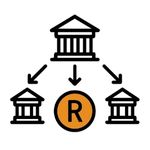
The National Treasury of South Africa is responsible for managing the country’s public finances. It oversees the national budget, monitors government spending, and helps keep the economy stable. While many people may not deal with it directly, the Treasury affects daily life through taxes, government services, and loan costs. Whether you’re a taxpayer, business owner, or investor, knowing how it works can help you stay informed and make better financial choices.
Key Takeaways
- Manages Public Finances: The National Treasury oversees South Africa’s national budget, tax policies, and government spending, ensuring funds are used effectively to support economic development and public services.
- Influences Daily Life: Treasury decisions affect everyday matters such as VAT, income tax, loan interest rates, public grants, and service delivery, shaping the financial environment for individuals and businesses.
- Drives Long-Term Policy: Through programmes like Operation Vulindlela and infrastructure investment, the Treasury supports job creation, economic reform, and sustainable growth across all sectors.
About Arcadia Finance
Get the loan you need through Arcadia Finance. Compare offers from 19 reliable lenders, all registered with the National Credit Regulator. No application fees.
The Role Of The National Treasury
The National Treasury oversees the financial management of South Africa’s national government. It plays a central role in ensuring that public funds are used properly and responsibly. Its goal is to support sound financial practices that contribute to economic growth, better governance, improved public services, and a higher standard of living across the country.
The Treasury aims to make sure that financial resources are fairly and efficiently distributed across all levels of government. This helps reduce poverty and improve the living conditions of South Africans who face economic hardship. It continues to focus on responsible budgeting and spending to support the country’s development.
Over the coming decade, the National Treasury has outlined several key focus areas. These include boosting investment in infrastructure and industrial sectors, strengthening education and skills development to increase workforce productivity, improving how public institutions and markets are managed, and addressing poverty and inequality. The strategy involves better delivery of public services, creating more jobs, offering income support, and promoting broader economic participation.

Core Responsibilities of the National Treasury
The National Treasury is tasked with managing South Africa’s public finances, as set out in the Constitution (Chapter 13) and the Public Finance Management Act (PFMA). Its work focuses on financial planning, control, and accountability across all levels of government.

Fiscal and Macroeconomic Policy
The Treasury sets and coordinates fiscal and economic policy. It decides how much the government can spend and ensures that this stays within sustainable levels. It works with bodies like the South African Reserve Bank (SARB) and South African Revenue Services (SARS) to support stable economic growth. By monitoring economic trends and risks, the Treasury helps maintain a balance between government income, spending, and debt.

Budget Preparation and Oversight
The Treasury leads the national budget process each year. It prepares the Budget Review and Estimates of National Expenditure, reviews departmental funding requests, and sets spending limits. It tracks how departments and provinces use their funds and enforces compliance with financial rules. It also deals with cases of wasteful or unauthorised spending, ensuring that public money is used properly.

Management of the National Revenue Fund
All tax and other state revenue is kept in the National Revenue Fund, which the Treasury manages. It monitors the fund’s daily transactions and authorises withdrawals. Any use of these funds must follow strict procedures. The Treasury can invest temporary surpluses and may release funds for emergencies, all within legal limits and reporting requirements.

Intergovernmental Revenue Sharing
The Treasury oversees how national revenue is shared with provinces and municipalities. This is managed through the Division of Revenue Act, which ensures fair and needs-based distribution. Funds are allocated both as general support and for specific services. The Treasury monitors how these funds are used to make sure services are delivered and spending rules are followed.

Public Financial Management and Governance
Under the PFMA, the Treasury sets financial standards for departments and public entities. It ensures proper accounting, reporting, and internal controls are in place. The Treasury audits public institutions and supervises major contracts and partnerships. If issues are found, it can take action to correct them. This oversight supports clean governance and reduces misuse of funds.

Debt, Cash Flow and Investment Management
The Treasury manages government borrowing and overall cash flow. It handles the issuing of bonds and ensures debt remains manageable. It can invest unused funds to improve returns and can draw on contingency reserves when needed. This helps the government meet its financial obligations without disruption.

Tax Policy Advice
The Treasury works with SARS and the Minister of Finance to shape tax policy. It advises on changes to tax rates, structures, and new taxes. These recommendations aim to support revenue goals and broader social and economic priorities. Tax policy updates are usually presented in the national budget each year.

Organisational Structure and Key Units
The National Treasury operates under the authority of the Minister and Deputy Minister of Finance, supported by the Director‑General. This leadership team sets the strategic direction and oversees key divisions.
Key units include:
- Office of the Accountant‑General: Oversees public accounting, ensures audits and internal controls, and supports financial systems across all government departments.
- Fiscal Policy Unit: Develops fiscal and tax policy to support sustainable economic growth.
- Public Sector Remuneration Unit: Deals with salary policies for public servants.
- Infrastructure Regulation and Assessment Unit: Monitors state infrastructure projects and spending.
- Capacity Building and Technical Assistance Unit: Supports other government departments with training, risk management, and compliance.
- Intergovernmental Relations Unit: Coordinates financial matters between national, provincial, and local governments.
- International Economic Cooperation Unit: Manages South Africa’s involvement in organisations such as the African Development Bank, World Bank, International Monetary Fund (IMF) and the BRICS economic coalition. It also handles development funding and regional economic agreements.
These units work together to ensure transparent budgeting, fair spending, regulatory oversight, and coordination with both domestic and international financial bodies.
Major Programmes and Initiatives
The National Treasury delivers several large-scale programmes that have direct effects on public services and economic growth:
| Programme/Initiative | Description |
|---|---|
| National Budget and Estimates of Expenditure | Prepared annually by the Treasury, these documents detail planned revenue, departmental spending, and allocations to guide government decisions at all levels. |
| Cities Support Programme (CSP) | Assists major metros in enhancing financial and planning capacities. Promotes integrated urban development and more inclusive, efficient city governance. |
| Operation Vulindlela | A joint initiative with the Presidency to fast-track structural reforms in electricity, water, transport, and telecoms to reduce bottlenecks and boost economic recovery. |
| Infrastructure Investment and Public-Private Partnerships (PPPs) | Treasury promotes infrastructure through blended finance, including credit guarantees and risk-sharing to encourage private sector participation in critical sectors. |
| World Bank‑supported Infrastructure Loans | A $1.5 billion World Bank loan was secured to upgrade rail, port, and energy infrastructure, using favourable terms to reduce debt pressure and support growth. |
| Electric Vehicles and Green Energy Incentives | A R1 billion support package for local EV and battery manufacturing, aligned with the 2023 EV White Paper, aiming to attract R30 billion in private investment. |
| Social Grants and Welfare Oversight | Treasury manages key grants like the Child Support Grant, which provide essential financial support to millions and are central to national social spending. |
| Debt Management and Macro‑Financial Policy | Overseen by the Public Debt Management Unit, this involves borrowing, managing national debt, setting inflation targets, and coordinating with agencies like the SARB. |

How The National Treasury Affects You
The National Treasury plays a central role in how government policy and money decisions affect individuals, households, and businesses. Although many South Africans do not interact with the Treasury directly, its work influences your daily financial reality in several key areas.
Taxes and the Cost of Living
The Treasury decides how much tax the government needs to collect and how that money will be spent. This includes setting rates for VAT, income tax, fuel levies, and other charges.
- When VAT is increased, the prices of goods and services also rise. For instance, a VAT increase in the 2025 budget was expected to bring in an additional R13.5 billion.
- Income tax brackets and rebates, adjusted by the Treasury each year, directly affect how much take-home pay you receive.
Interest Rates and Borrowing Costs
The Treasury works closely with the South African Reserve Bank to help manage inflation targets and macroeconomic policy. This affects the repo rate, which in turn influences what you pay for home loans, vehicle finance, and credit cards.
- When inflation is stable, interest rates can be lowered, which helps reduce loan repayments.
- If inflation rises or public debt becomes too high, interest rates may increase, making it more expensive to borrow.
In 2025, for example, a proposal to shift to a 3% inflation target could potentially bring interest rates down in the long term, reducing the cost of debt for households and businesses.
Public Services and Grants
Each year, the Treasury allocates money to different departments for healthcare, education, policing, and social welfare. If the Treasury adjusts budgets due to rising debt costs, there may be less funding available for essential services.
- In 2023/24, interest payments on government debt reached R356 billion, reducing available funds for other programmes.
- Child Support Grants, school feeding schemes, and health subsidies all depend on what the Treasury allocates and how departments spend that money.
Public sector workers’ salaries, grants for vulnerable groups, and infrastructure development are all shaped by Treasury planning.
Inflation and Economic Stability
The Treasury’s fiscal policies influence inflation, which impacts the prices of food, transport, electricity, and other household essentials. When government borrowing is excessive, it can lead to inflation, which reduces the purchasing power of the rand. On the other hand, disciplined spending and careful borrowing can help keep inflation within the Reserve Bank’s target range. This stability supports consumer confidence, protects the value of earnings and savings, and helps maintain affordable living costs. A stable economic environment benefits everyone by keeping price increases under control and ensuring that the economy functions more predictably
Access to Government Support and Jobs
Beyond managing taxes and budgets, the Treasury plays a role in how funds are released for emergency support and job creation. During times of crisis, such as natural disasters or public health emergencies, the Treasury may allocate money from the Contingency Reserve to respond quickly and maintain services. Treasury-led programmes such as Operation Vulindlela also aim to remove delays in key sectors like energy, transport, and water, which can encourage private investment and job growth. Other initiatives, including public-private partnerships and infrastructure projects, are supported through Treasury planning and financing, helping to generate employment and improve long-term economic prospects.
Conclusion
The National Treasury of South Africa plays a vital role in managing the country’s finances and supporting responsible governance. From preparing the national budget to setting tax policy and overseeing public spending, its influence reaches all levels of government and affects the financial lives of citizens every day. Whether through its role in managing inflation, allocating grants, or funding infrastructure, the Treasury’s work is central to maintaining economic stability and ensuring that public money is used in ways that benefit society as a whole. By understanding how the Treasury operates, South Africans can better navigate the impact of fiscal decisions on their personal and business finances.
Frequently Asked Questions
The National Treasury manages public finances at a national level. It prepares the annual budget, sets tax and spending policies, oversees government borrowing, and ensures funds are used properly across departments and provinces.
Treasury decisions impact the cost of living, including VAT and income tax, as well as the quality of public services such as education, healthcare, and transport. It also affects interest rates and grant availability.
Budget documents such as the Budget Review and Estimates of National Expenditure are available on the official National Treasury website during and after the budget announcement.
Yes. Individuals and suppliers can register on the Central Supplier Database for government tenders, apply for internships or graduate programmes, or access budget reports and public consultation documents.
The Treasury funds and supports infrastructure projects, often in partnership with the private sector. These projects aim to boost economic growth and create employment, especially through initiatives like Operation Vulindlela.
Fast, uncomplicated, and trustworthy loan comparisons
At Arcadia Finance, you can compare loan offers from multiple lenders with no obligation and free of charge. Get a clear overview of your options and choose the best deal for you.
Fill out our form today to easily compare interest rates from 19 banks and find the right loan for you.


